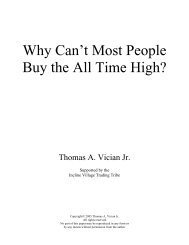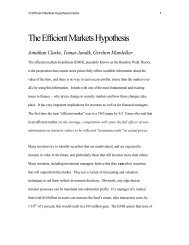Where the Money's Really Made: Louis Bacon - TurtleTrader
Where the Money's Really Made: Louis Bacon - TurtleTrader
Where the Money's Really Made: Louis Bacon - TurtleTrader
Create successful ePaper yourself
Turn your PDF publications into a flip-book with our unique Google optimized e-Paper software.
<strong>Where</strong> <strong>the</strong> Money http://bear.cba.ufl.edu/demiroglu/fin4504fall2004/Articles/article21.htm<br />
climb more than 11% just to get back to even, with <strong>the</strong> hedge fund manager getting no cut of that gain. If a fund<br />
drops two years in a row, many managers simply opt to close up shop and start afresh from zero with a new fund<br />
ra<strong>the</strong>r than try to pull up <strong>the</strong> old fund from deep in <strong>the</strong> hole.<br />
Size itself works against <strong>the</strong>se giant hedge funds. Everybody understands <strong>the</strong> difficulty that <strong>the</strong> manager of a<br />
big mutual fund like Fidelity Magellan has finding enough big ideas to move a multibillion-dollar fund. But for<br />
many giant hedge funds, that problem is exacerbated by <strong>the</strong> fact that <strong>the</strong>y short stocks, which means <strong>the</strong>y have<br />
to find shares to borrow. Shorting <strong>the</strong>se days "is really, really hard," says a prominent hedge fund manager.<br />
"There are so many more hedge funds out <strong>the</strong>re doing it, <strong>the</strong> supply of available shares is tight."<br />
Looming above all those problems is <strong>the</strong> issue of managing. Most hedge fund managers are infatuated with<br />
investing and much less interested in running a business. As such, <strong>the</strong> hedgie is like any o<strong>the</strong>r entrepreneur.<br />
"A hedge fund business may grow great guns at first, but if it is successful <strong>the</strong> manager needs to delegate and<br />
maybe do some outsourcing," says David "Tiger" Williams, who runs a trading operation that serves some of <strong>the</strong><br />
funds. Plus, a growing hedge fund will need systems, and a CFO, and back-office people, and compliance, and<br />
risk management. Some hedgies see <strong>the</strong> need for this, some don't. "When I am looking at a hedge fund to<br />
invest in, yes, I look at <strong>the</strong> track record, but I also look at <strong>the</strong> infrastructure," says Glenwood's Meyer. "The track<br />
record is looking backward. The systems in place help look forward."<br />
No one is more aware of those facts than Paul Tudor Jones, 48, who heads up <strong>the</strong> $7 billion Tudor Group in<br />
Greenwich. Jones, who declined to speak to FORTUNE, has been in <strong>the</strong> game of hedge fund management for<br />
20 years and is said to be fixated on maintaining a lasting business model. Instead of controlling all trading<br />
personally, <strong>the</strong> Memphis-born former cotton trader has farmed out some money management to top-end<br />
semiautonomous partners within Tudor. He has invested heavily in his office, and even though he is a true<br />
old-school macro investor (buying and selling all sorts of financial instruments all over <strong>the</strong> globe), he likes to view<br />
his fund as a sustainable company. Who knows? He might make it work.<br />
Will <strong>the</strong> hedge fund business keep growing willy-nilly? Should you pour your money in-to hedge funds? Will<br />
hedge funds save <strong>the</strong> world? The answer to all those questions is almost certainly no. In fact, you probably<br />
could have asked <strong>the</strong> same questions 30 years ago and gotten <strong>the</strong> same answer. Harking back to that 1970<br />
FORTUNE story, you get <strong>the</strong> feeling that for all <strong>the</strong> recent mania of late, <strong>the</strong>re really is a plus ca change to this<br />
world of hedge funds. In that piece Carol Loomis wrote of some hedge funds having a very tough go of it,<br />
including Fairfield Partners. One of <strong>the</strong> men running Fairfield was Barton Biggs, who would leave <strong>the</strong> hedge<br />
fund business in 1973 and accept what turned out to be a very lucrative deal to join Morgan Stanley.<br />
Biggs built Morgan Stanley's asset-management business over <strong>the</strong> next several decades and also became one<br />
of <strong>the</strong> Street's leading investment strategists. Along <strong>the</strong> way he became well-known for his pointed weekly<br />
research commentary on <strong>the</strong> markets. (Also along <strong>the</strong> way his niece, Fiona, married hedgie Stan Druckenmiller.)<br />
Biggs has been known as a sharp-eyed observer, quick to steer clients clear of manias. A year ago Biggs<br />
warned of a "hedge fund bubble" that was sweeping across Wall Street. That apparently was <strong>the</strong>n, and this is<br />
now. In January, Biggs, 70, announced that he was leaving Morgan Stanley after nearly three decades at <strong>the</strong><br />
firm. Was Biggs, now a very wealthy man, departing full-time to Lyford Cay? Actually no, he is leaving to start a<br />
hedge fund. It's called Traxis, if you ever get <strong>the</strong> call.<br />
5 of 5 12/13/04 11:08 PM




